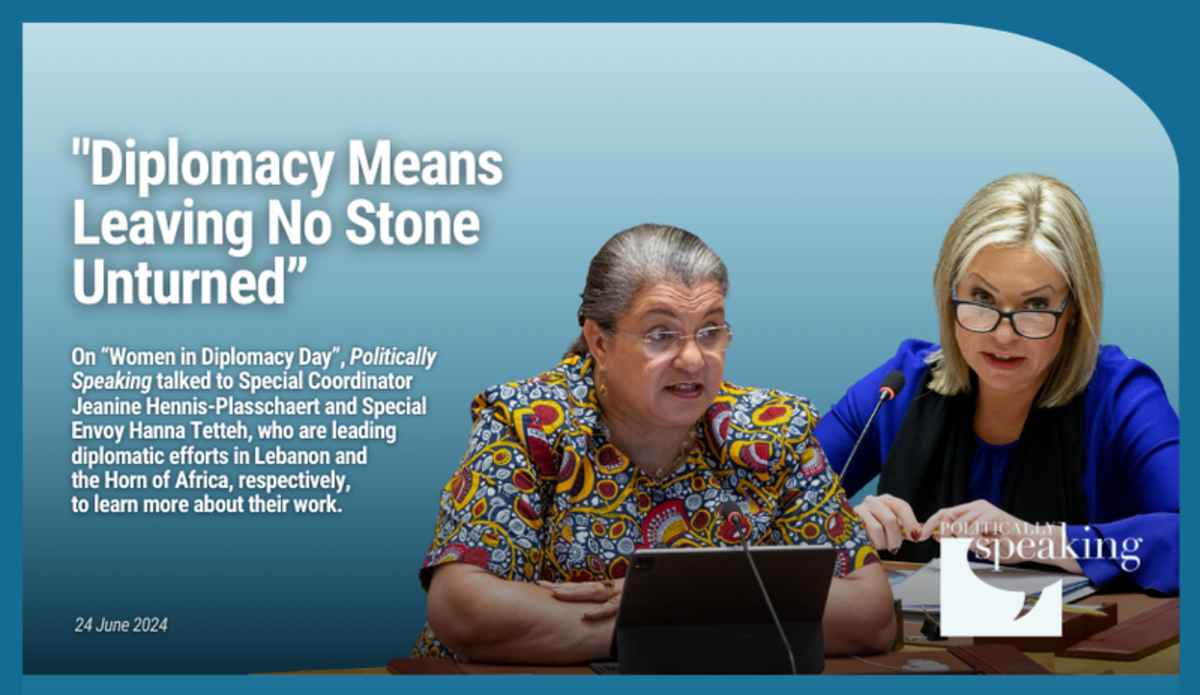On the occasion of “Women in Diplomacy Day”, marked on 24 June, Politically Speaking talked to Special Coordinator Jeanine Hennis-Plasschaert and Special Envoy Hanna Tetteh, who are leading diplomatic efforts in Lebanon and the Horn of Africa, respectively, to learn more about their work.
“The UN does not have a magic wand and we do not pretend to have a solution for every ill — be it here in Lebanon or anywhere else,” Jeanine Hennis-Plasschaert, newly appointed Special Coordinator for Lebanon, told Politically Speaking on the occasion of the International Day of Women in Diplomacy.
“At the end of the day, both conflict and peace, poverty and prosperity hinge on the political will of the world’s states. But if we can make a difference in the lives of people, it is worth stepping up and continuing to try,” she added.
Hennis-Plasschaert assumed her role as 1 June 2024, after serving almost 6 years as Special Representative and head of the UN Assistance Mission for Iraq (UNAMI).
In Lebanon, her work includes trying to de-escalate tensions between Israel and Lebanon, which have intensified the exchange of fire across the Blue Line in recent months, and return to a cessation of hostilities.
“Once a cessation of hostilities is reached, we’ll need to move, swiftly and decisively, on working with all parties toward sustainable solutions, in line with Security Council resolution 1701.”
In practice, the Special Coordinator’s work involves talking to various actors to seek common ground and encourage compromise. “Diplomacy means leaving no stone unturned to help find solutions to problems or conflicts that appear to be unsolvable,” she said.
Confidence building
One key aspect of such diplomatic work is building trust between the UN, governments, conflict parties, civil society and other stakeholders.
“Without trust you cannot achieve much,” explained Hanna Tetteh, who is serving as Special Envoy to the Horn of Africa since 2022, after working three years as Special Representative to the African Union.
But building trust is no easy task, especially in vulnerable regions like the Horn of Africa.
“Within fragile contexts it is even more difficult because of the high level of suspicions and mistrust between the actors,” she explained, pointing for instance to peacebuilding efforts between the Misseriya and Dinka ethnic groups living in the contested area of the Abyei Box.
Similarly, the Special Coordinator for Lebanon said that fostering trust in the UN can at times be challenging.
“To be candid, not everyone we meet has always nice things to say about the UN,” said Hennis-Plasschaert. “Sometimes this is justified, sometimes not. But meeting those who understand its value, what it stands for, and what it has managed to achieve or, indeed, to prevent, is the most rewarding part of our job.”
Seeking a coordinated approach
Both the Special Coordinator and the Special Envoy work in complex contexts which are often affected by multiple crises at the same time. Lebanon, for instance, is facing not only a political, but also financial and socio-economic crises, which require collective efforts to be addressed.
In the Horn of Africa, the Office of the Special Envoy plays a key role in addressing cross-cutting issues with a regional lens. Since it was established in 2018, it has been working with the Inter-Governmental Authority on Development (IGAD) to support the region in conflict prevention and mediation and in addressing the interrelations between climate change and peace and security or women and youth participation.
Tetteh said working closely with other political and peacekeeping missions, other UN entities and the African Union is key to “ensure the UN work is less siloed, more coherent and consistent.”
Tetteh’s office worked closely with the African Union, IGAD, the US, EU and the conflict parties in the Ethiopian peace process that led to the signing of the Cessation of Hostilities Agreement (COHA) in November 2022.
Looking back at that achievement, the Special Envoy said the coordinated efforts put an end to two years of conflict, but more should have been done to ensure women’s leadership in peace efforts. She also expressed concerns about the “less than optimal” participation of women in the ongoing Sudan peace process, adding that more work needs to be done in this area.
Adopting a flexible approach
Both the Special Coordinator and the Special Envoy also highlighted the importance of being surrounded by a network of peers to rely on and who can provide a comprehensive picture of the context and developments of specific countries or regions.
At the same time, according to Hennis-Plasschaert, it is important to make sure such a group of people is diverse, to enrich decision-making. “While the easiest thing to do is to surround yourself with people who look and think the same as you, strong decision-making, strong leadership comes from working with colleagues from diverse backgrounds,” she said.
Overall, diplomatic work in conflict and peacebuilding settings requires a certain degree of flexibility, as new issues can arise at any moment.
“But the same is true for opportunities,” Hennis-Plasschaert pointed out.
“Working in a position like this, you need to be hands-on, and ready to jump on a call, into a car or onto a plane at any moment,” she concluded.



